Daily Vocabulary Words: List of Daily Used Words in Leading International Newspapers
Hi there. Welcome to this special section @ Wordpandit.
Our endeavour here is very simple: to highlight important daily vocabulary words, which you would come across in leading newspapers in the country. We have included the following newspapers in our selection:
• The New York Times
• The Washington Post
• Scientific American
• BBC
• The Guardian
• Psychology Today
• Wall Street Journal
• The Economist
We are putting in extensive work for developing your vocabulary. All you have got to do is be regular with this section and check out this post on a daily basis. This is your repository of words that are commonly used and essentially, we are posting a list of daily used words. Hence, this has significant practical application as it teaches you words that are used commonly in leading publications mentioned above.
Visit the website daily to learn words from leading international newspapers.
WORD-1: Embodiment
CONTEXT: The bomb-throwing congresswoman from Georgia is in many ways the female embodiment of Trumpism.
SOURCE: New York Times
EXPLANATORY PARAGRAPH: Embodiment is like being the perfect example of something. It’s like if someone is very, very kind, they are the embodiment of kindness.
MEANING: A tangible or visible form of an idea, quality, or feeling (noun).
PRONUNCIATION: em-bod-ee-ment
SYNONYMS: Personification, Incarnation, Epitome, Manifestation, Quintessence.
USAGE EXAMPLES:
1. She is the embodiment of generosity.
2. The statue was an embodiment of the city’s spirit.
3. His work is the embodiment of creative thinking.
4. The new policy is an embodiment of the government’s strategy.
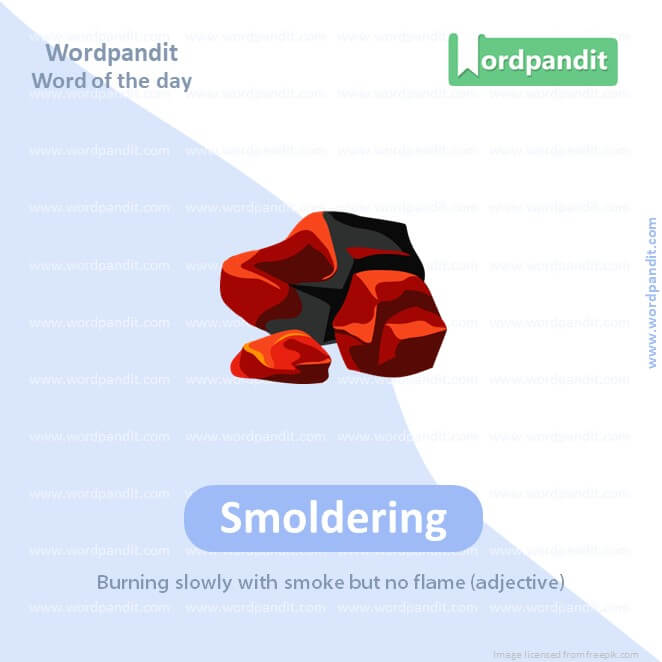
WORD-2: Smoldering
CONTEXT: the Airbus got out safely before the entire plane was engulfed in flames and reduced to a smoldering wreck.
SOURCE: New York Times
EXPLANATORY PARAGRAPH: Smoldering is like something burning slowly with smoke but no flame. It’s like how charcoal looks in a barbecue before it gets really hot.
MEANING: Burning slowly with smoke but no flame (adjective).
PRONUNCIATION: smol-der-ing
SYNONYMS: Burning, Glowing, Simmering, Fuming, Smoking.
USAGE EXAMPLES:
1. The fire was smoldering in the fireplace.
2. Smoldering embers remained after the campfire.
3. His smoldering anger was noticeable.
4. She noticed the smoldering ruins of the house.
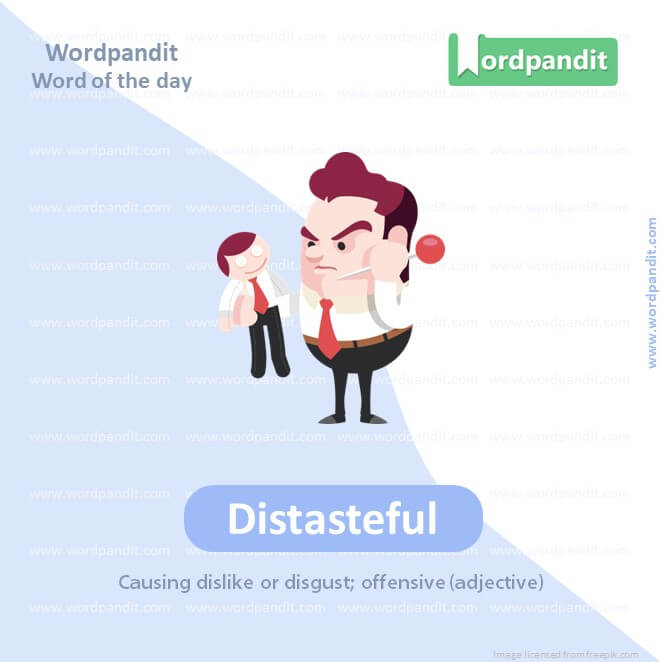
WORD-3: Distasteful
CONTEXT: More generally, does he find it admirable or distasteful that she has long been seen as lobbying for the job and has even begun publicly issuing advice on the matter.
SOURCE: New York Times
EXPLANATORY PARAGRAPH: Distasteful is when you don’t like something because it seems bad or unpleasant. It’s like tasting a food that you think is yucky.
MEANING: Causing dislike or disgust; offensive (adjective).
PRONUNCIATION: dis-taste-ful
SYNONYMS: Unpleasant, Unpalatable, Off-putting, Repugnant, Disagreeable.
USAGE EXAMPLES:
1. He found the behavior of his opponent distasteful.
2. The distasteful joke upset many people.
3. The room was decorated in distasteful colors.
4. She expressed her opinion on the distasteful subject.
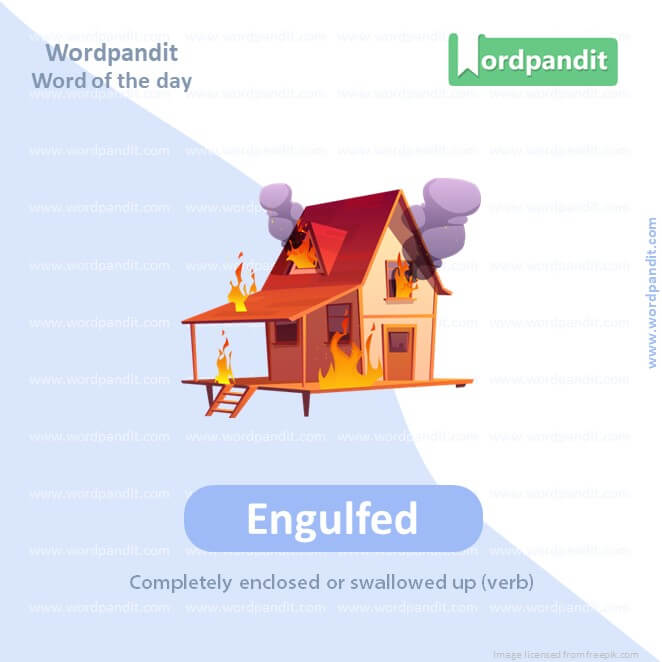
WORD-4: Engulfed
CONTEXT: the Airbus got out safely before the entire plane was engulfed in flames and reduced to a smoldering wreck.
SOURCE: New York Times
EXPLANATORY PARAGRAPH: Engulfed is like being completely covered or surrounded by something. It’s like being buried in a pile of leaves.
MEANING: Completely enclosed or swallowed up (verb).
PRONUNCIATION: en-gulfed
SYNONYMS: Swallowed, Overwhelmed, Enveloped, Consumed, Overtaken.
USAGE EXAMPLES:
1. The house was engulfed in flames.
2. He was engulfed by a feeling of sadness.
3. The small village was engulfed by the flood.
4. The crowd engulfed the celebrity as he walked by.
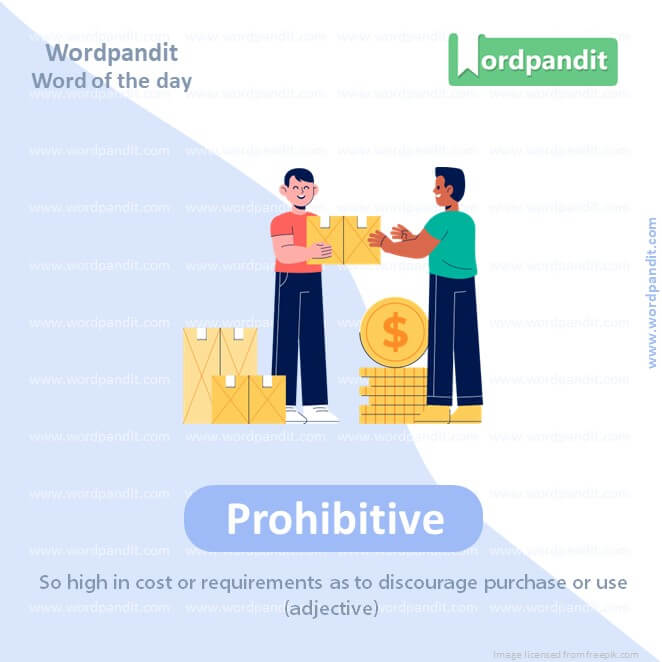
WORD-5: Prohibitive
CONTEXT: it’s best to mentally prepare oneself for the likelihood that the guy who has long been the prohibitive front-runner will, in fact, win the nomination.
SOURCE: New York Times
EXPLANATORY PARAGRAPH: Prohibitive is like something being too expensive or too much for you to have. It’s like a toy that costs so much money that you can’t buy it.
MEANING: So high in cost or requirements as to discourage purchase or use (adjective).
PRONUNCIATION: pro-hib-i-tive
SYNONYMS: Excessive, Exorbitant, Steep, Extortionate, Unaffordable.
USAGE EXAMPLES:
1. The price of the car was prohibitive.
2. Prohibitive costs prevented them from renovating the house.
3. The entry fee was prohibitive for many attendees.
4. Regulations in the area were considered prohibitive.
WORD-6: Depressurization
CONTEXT: Boeing 737 Max 9 plane blew out a few minutes after takeoff, causing the plane to undergo rapid depressurization.
SOURCE: New York Times
EXPLANATORY PARAGRAPH: Depressurization is like letting air out of something that is full of pressure. It’s like when you slowly let air out of a balloon so it doesn’t pop.
MEANING: The reduction of pressure in a container or environment (noun).
PRONUNCIATION: dee-pres-shur-i-za-tion
SYNONYMS: Decompression, Deflation, Pressure Reduction, Pressure Release, Vacuum Release.
USAGE EXAMPLES:
1. The cabin experienced rapid depressurization.
2. Depressurization in the tank was controlled.
3. Safety protocols were followed during depressurization.
4. The process required careful depressurization steps.
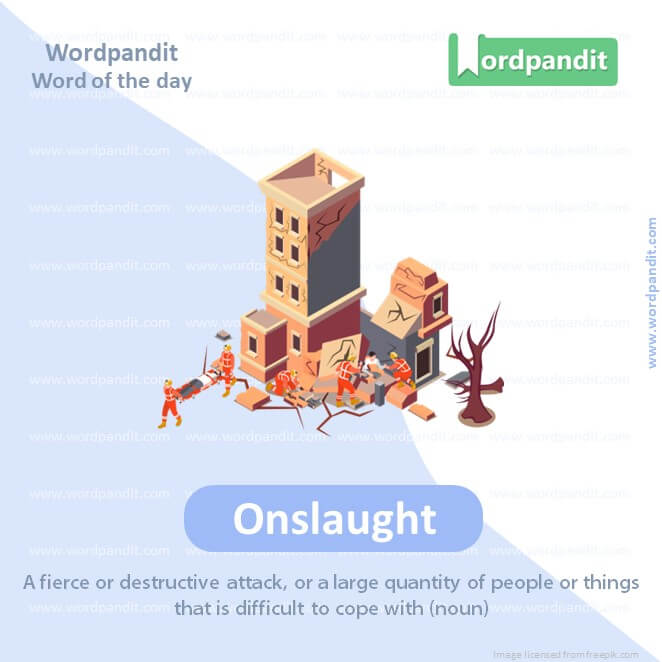
WORD-7: Onslaught
CONTEXT: the world soon learned that the real problem had been corporate greed that had taken too many shortcuts while the regulators hadn’t managed to resist the onslaught.
SOURCE: New York Times
EXPLANATORY PARAGRAPH: Onslaught is like a very strong attack or a lot of something coming all at once. It’s like when a wave crashes over you at the beach.
MEANING: A fierce or destructive attack, or a large quantity of people or things that is difficult to cope with (noun).
PRONUNCIATION: on-slawt
SYNONYMS: Assault, Attack, Barrage, Blitz, Onset.
USAGE EXAMPLES:
1. The castle withstood the enemy’s onslaught.
2. They faced an onslaught of criticism.
3. The onslaught of questions overwhelmed him.
4. The team prepared for the onslaught of the competition.
WORD-8: Pressurization
CONTEXT: The N.T.S.B. told reporters that a pressurization warning light in this plane had come on three times before, at least once in flight, during its short time in service.
SOURCE: New York Times
EXPLANATORY PARAGRAPH: Pressurization is like filling something up with air or gas until there’s a lot of pressure inside. It’s like pumping air into a tire so it gets firm.
MEANING: The application of pressure to a gas or liquid; the process of pressurizing a space (noun).
PRONUNCIATION: pres-shur-i-za-tion
SYNONYMS: Compression, Inflation, Pumping Up, Air Filling, Pressure Application.
USAGE EXAMPLES:
1. Pressurization of the cabin is essential for high-altitude flights.
2. The tank requires careful pressurization.
3. Pressurization in the system was closely monitored.
4. They used a machine for the pressurization of the container.
WORD-9: Accumulation
CONTEXT: Those N.T.S.B. investigation reports that I cherish reading represent just that kind of accumulation.
SOURCE: New York Times
EXPLANATORY PARAGRAPH: Accumulation is like collecting or gathering a lot of something over time. It’s like how leaves accumulate in the yard during fall.
MEANING: The gathering together of items over a period of time (noun).
PRONUNCIATION: ac-cu-mu-la-tion
SYNONYMS: Collection, Gathering, Assemblage, Pileup, Aggregation.
USAGE EXAMPLES:
1. The accumulation of data was essential for the research.
2. Leaves showed accumulation in the corner of the yard.
3. His wealth was the result of years of accumulation.
4. The room was cluttered with an accumulation of books.
WORD-10: Reimbursed
CONTEXT: the Arkansas G.O.P. promptly reimbursed the state for after a journalist noted the purchase
SOURCE: New York Times
EXPLANATORY PARAGRAPH: Reimbursed is like getting back the money you spent. It’s like if you buy something for a friend, and then they give you the money back.
MEANING: Repaid or compensated for expenses or losses (verb).
PRONUNCIATION: ree-im-burst
SYNONYMS: Compensated, Refunded, Repaid, Restituted, Recompensed.
USAGE EXAMPLES:
1. She was reimbursed for her travel expenses.
2. The company reimbursed him for the damaged goods.
3. They were promptly reimbursed after the event.
4. He submitted his receipts to be reimbursed.
Vocabulary Sentence
The task of mastering language stretches beyond the realm of solitary words. It invites us to construct and comprehend a ‘vocabulary sentence’. This amalgamation of words into meaningful sentences adds layers to our linguistic prowess. However, effectively learning from a ‘vocabulary sentence’ requires some strategic insight. So, how should we approach it?
Firstly, when encountering a ‘vocabulary sentence’, it’s pivotal to comprehend the word in context. Deciphering its place and role in the sentence gives a deeper insight into the word’s meaning, usage, and nuances. This approach aids in firm retention and active application of words.
Another technique to master a ‘vocabulary sentence’ is to break it into manageable chunks. Look at each word, understand its function, and then put it all together to comprehend the sentence as a whole. This step-by-step dissection and understanding better cements the ‘vocabulary sentence’ into your learning.
Mimicking the prosody and rhythm of language while practicing ‘vocabulary sentence’ can also foster better learning. In this regard, listening to podcasts or watching videos in the target language can be exceptionally beneficial. They showcase real-life demonstrations of how words are strung together into sentences with correct stress patterns and intonations.
Lastly, crafting your own ‘vocabulary sentence’ with learnt words strengthens understanding and boosts recall. Be it during conversation or writing, actively using these sentences plays a key role in contextual learning.
In essence, unfolding a ‘vocabulary sentence’ is a treasure trove of learning opportunities. With proper understanding, breaking sentences into chunks, mimicking prosody, and actively crafting sentences, the journey of learning from a ‘vocabulary sentence’ becomes engaging and fruitful. Every sentence learnt and applied is a valuable catch in the linguistic sea!











